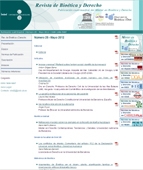Antonio Vallejo Nagera (1889-1960) and Eugenics in Franco's Spain. When science was the argument for offspring's ownership
Article Sidebar

Main Article Content
Claudio Francisco Capuano
Universidad de Buenos Aires
Alberto J. Carli
Universidad de Buenos Aires
In the early decades of twentieth century in Spain, a group of intellectuals and men belonging to science and linked to fascism, including the doctor Antonio Vallejo Nagera, adhered and extended the concept of eugenics with different motives, one of wich was to improve the race, another to legitimize and be guarantor of the new order. For this, they served of different schools that were developed theoretically from this concept, one of them was generated by the ideas of Jean Baptiste Lamark (1744-1829), who developed the hypothesis that the environment produces changes in organisms or races, held at the time are transmitted hereditarily. The purpose of this work is to evaluate what were the origins, characteristics and doctrinal framework of eugenics in Spain during the Franco period and how was used as an argument for appropriation of descent.
Key words: Human Rights, Vallejo Nagera, eugenics, appropriation of descent.
Key words: Human Rights, Vallejo Nagera, eugenics, appropriation of descent.
Article Details
How to Cite
Capuano, Claudio Francisco; and Carli, Alberto J. “Antonio Vallejo Nagera (1889-1960) and Eugenics in Franco’s Spain. When science was the argument for offspring’s ownership”. Revista de bioética y derecho, no. 26, pp. 3-12, https://raco.cat/index.php/RevistaBioeticaDerecho/article/view/258986.
Rights
Copyright
The author retains the copyright and grants Revista de Bioética y Derecho the right of first publication of the article. All articles published in Revista de Bioética y Derecho are under Creative Commons licensing Recognition – Non Commercial – NoDerivedArtwork (by-nc-nd 4.0), which allows sharing the content with third parties, provided that they acknowledge its authorship, initial publication in this journal and the terms of the license. No commercial use of the original work or generation of derivative works is permitted.
Author Biographies
Claudio Francisco Capuano, Universidad de Buenos Aires
Médico. Máster en Bioética y Derecho: Problemas en Salud y Biotecnología, Universidad de Barcelona, Promoción 2007-2009. Coordinador de la Cátedra Libre de Salud y Derechos Humanos de la Facultad de Medicina y Director del Centro de Documentacion Pedro de Sarasqueta.Alberto J. Carli, Universidad de Buenos Aires
Dr. en Medicina, Médico Cardiólogo Universitario, Magister Scientiae en Metodología de la Investigación Científica y Tecnológica. Profesor Consulto Adjunto de la Facultad de Medicina de la Universidad de Buenos Aires.Most read articles by the same author(s)
- Claudio Francisco Capuano, La ética médica cuando se violan los Derechos Humanos. La participación médica en el Terrorismo de Estado. Los procesados y condenados , Revista de bioética y derecho: No. 22 (2011)